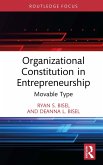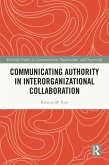The Routledge Handbook of the Communicative Constitution of Organization (eBook, PDF)
Redaktion: Basque, Joëlle; Kuhn, Timothy; Bencherki, Nicolas
47,95 €
47,95 €
inkl. MwSt.
Sofort per Download lieferbar

24 °P sammeln
47,95 €
Als Download kaufen

47,95 €
inkl. MwSt.
Sofort per Download lieferbar

24 °P sammeln
Jetzt verschenken
Alle Infos zum eBook verschenken
47,95 €
inkl. MwSt.
Sofort per Download lieferbar
Alle Infos zum eBook verschenken

24 °P sammeln
The Routledge Handbook of the Communicative Constitution of Organization (eBook, PDF)
Redaktion: Basque, Joëlle; Kuhn, Timothy; Bencherki, Nicolas
- Format: PDF
- Merkliste
- Auf die Merkliste
- Bewerten Bewerten
- Teilen
- Produkt teilen
- Produkterinnerung
- Produkterinnerung

Bitte loggen Sie sich zunächst in Ihr Kundenkonto ein oder registrieren Sie sich bei
bücher.de, um das eBook-Abo tolino select nutzen zu können.
Hier können Sie sich einloggen
Hier können Sie sich einloggen
Sie sind bereits eingeloggt. Klicken Sie auf 2. tolino select Abo, um fortzufahren.

Bitte loggen Sie sich zunächst in Ihr Kundenkonto ein oder registrieren Sie sich bei bücher.de, um das eBook-Abo tolino select nutzen zu können.
This Handbook offers state of the art scholarship on the perspective known as the Communicative Constitution of Organizations (CCO).
- Geräte: PC
- mit Kopierschutz
- eBook Hilfe
Andere Kunden interessierten sich auch für
![The Routledge Handbook of the Communicative Constitution of Organization (eBook, ePUB) The Routledge Handbook of the Communicative Constitution of Organization (eBook, ePUB)]() The Routledge Handbook of the Communicative Constitution of Organization (eBook, ePUB)47,95 €
The Routledge Handbook of the Communicative Constitution of Organization (eBook, ePUB)47,95 €![Working Through Conflict (eBook, PDF) Working Through Conflict (eBook, PDF)]() Joseph P. FolgerWorking Through Conflict (eBook, PDF)121,95 €
Joseph P. FolgerWorking Through Conflict (eBook, PDF)121,95 €![Organizational Constitution in Entrepreneurship (eBook, PDF) Organizational Constitution in Entrepreneurship (eBook, PDF)]() Ryan S. BiselOrganizational Constitution in Entrepreneurship (eBook, PDF)20,95 €
Ryan S. BiselOrganizational Constitution in Entrepreneurship (eBook, PDF)20,95 €![Communicating Authority in Interorganizational Collaboration (eBook, PDF) Communicating Authority in Interorganizational Collaboration (eBook, PDF)]() Rebecca M. RiceCommunicating Authority in Interorganizational Collaboration (eBook, PDF)42,95 €
Rebecca M. RiceCommunicating Authority in Interorganizational Collaboration (eBook, PDF)42,95 €![Listening (eBook, PDF) Listening (eBook, PDF)]() Judi BrownellListening (eBook, PDF)97,95 €
Judi BrownellListening (eBook, PDF)97,95 €![Multigenerational Communication in Organizations (eBook, PDF) Multigenerational Communication in Organizations (eBook, PDF)]() Michael G. StrawserMultigenerational Communication in Organizations (eBook, PDF)21,95 €
Michael G. StrawserMultigenerational Communication in Organizations (eBook, PDF)21,95 €![Group Communication (eBook, PDF) Group Communication (eBook, PDF)]() Group Communication (eBook, PDF)66,95 €
Group Communication (eBook, PDF)66,95 €-
-
-
This Handbook offers state of the art scholarship on the perspective known as the Communicative Constitution of Organizations (CCO).
Dieser Download kann aus rechtlichen Gründen nur mit Rechnungsadresse in A, B, BG, CY, CZ, D, DK, EW, E, FIN, F, GR, HR, H, IRL, I, LT, L, LR, M, NL, PL, P, R, S, SLO, SK ausgeliefert werden.
Produktdetails
- Produktdetails
- Verlag: Taylor & Francis eBooks
- Seitenzahl: 584
- Erscheinungstermin: 24. April 2022
- Englisch
- ISBN-13: 9781000582789
- Artikelnr.: 63740826
- Verlag: Taylor & Francis eBooks
- Seitenzahl: 584
- Erscheinungstermin: 24. April 2022
- Englisch
- ISBN-13: 9781000582789
- Artikelnr.: 63740826
- Herstellerkennzeichnung Die Herstellerinformationen sind derzeit nicht verfügbar.
Joëlle Basque is Assistant Professor in the Department of Human Sciences, Arts and Communication at Université TÉLUQ in Montréal, Canada. Nicolas Bencherki is Associate Professor in the Department of Human Sciences, Arts and Communication at Université TÉLUQ in Montréal, Canada. Timothy Kuhn is Professor in the College of Media, Communication and Information at the University of Colorado Boulder, USA.
Foreword: The Emerging Paradigm of Communication Constitutes Organization
(CCO); Introduction; Part I: Theoretical Discussions; 1. The Theoretical
Roots of CCO; 2. What's Pragmatic about Ambiguity in the Communicative
Constitution of Organizations? The Case of CCO Scholarship's Establishment;
3. Organization as Conversation and Text; 4. Theorizing Communication and
Constitution of Organizations from a Four Flows (Structurational)
Perspective; 5. The Communicative Constitution of the World: A Luhmannian
View on Communication, Organizations, and Society; 6. The Multiple Roles of
Materiality When Communication Constitutes Organizations; 7. Disrupting CCO
Thinking: A Communicative Ontology of Dis/Organization; 8. The
Communicative Constitution of Organizationality; 9. The Communicative
Constitution of Epistemic and Deontic Authority: Epistemological
Implications of a Second-Order Construct; 10. Uncritical Constitution: CCO,
Critique and Neoliberal Capitalism; 11. Queering CCO Scholarship: Examining
Communication as Constitutive of (Hetero)normative Organizations and
Organizing; Part II: Opening Up CCO's Methodological Approaches; 12. The
Umbrella of Discourse Analysis and Its Role in CCO; 13. Acting in the Name
of Others: How to Unpack Ventriloquations; 14. Ethnomethodological
Conversation Analysis and the Constitutive Role of Organizational Talk; 15.
Archives in CCO Research: A Relational View; 16. Adventurous Ideas for
Ethnographic Research on the Communicative Constitution of Organizations;
Part III: How CCO Handles Classic Management Themes; 17. Authority
According to CCO: Recursivity, Emergence, and Durability; 18. CCO Theory
and Leadership; 19. Exploring Identity Matters in the Communicative
Constitution of Organizations; 20. What's in a Project? Extending Inquiries
into Projects with a CCO Perspective; 21. Strategic Management and CCO: A
Generative Nexus; 22. The Communicative Constitution of Corporate Social
Responsibility; 23. The Blue Marble Effect: Globalization, Visibility and
Lenticulation; 24. Voices, Bodies and Organizations: Bridging CCO
Scholarship and Diversity Research; 25. Civil Society Collaboration and
Inter-Organizational Relationships; 26. Digital Media: From Tools to Agents
Making a Difference; 27. The Communicative Constitution of Organizational
Memory; Part IV: What Difference Does CCO Make for Practice?; 28. CCO and
the Academic-Professional Gap: Combining Rigor and Relevance in
Organizational Communication; 29. Where Are the Organizations? Accounting
for the Fluidity and Ambiguity of Organizing in the Arts; 30. CCO in
Practice: Spacing and Humanitarian Organizing; 31. Constituting the
Blue-Collar Organization: How Social and Material Dimensions Are
Discursively Combined to (Re)construct the Factory; 32. Constituting
Hazards and Action through Communication: A CCO View of High-Reliability
Organizing; 33. The Theoretical Hitchhiker's Guide to Sensemaking,
Coorientation, and Status Asymmetry; Afterword: The Emergence of the
Communicative Constitution of Organization and the Montréal School: An
Interview with James R. Taylor
(CCO); Introduction; Part I: Theoretical Discussions; 1. The Theoretical
Roots of CCO; 2. What's Pragmatic about Ambiguity in the Communicative
Constitution of Organizations? The Case of CCO Scholarship's Establishment;
3. Organization as Conversation and Text; 4. Theorizing Communication and
Constitution of Organizations from a Four Flows (Structurational)
Perspective; 5. The Communicative Constitution of the World: A Luhmannian
View on Communication, Organizations, and Society; 6. The Multiple Roles of
Materiality When Communication Constitutes Organizations; 7. Disrupting CCO
Thinking: A Communicative Ontology of Dis/Organization; 8. The
Communicative Constitution of Organizationality; 9. The Communicative
Constitution of Epistemic and Deontic Authority: Epistemological
Implications of a Second-Order Construct; 10. Uncritical Constitution: CCO,
Critique and Neoliberal Capitalism; 11. Queering CCO Scholarship: Examining
Communication as Constitutive of (Hetero)normative Organizations and
Organizing; Part II: Opening Up CCO's Methodological Approaches; 12. The
Umbrella of Discourse Analysis and Its Role in CCO; 13. Acting in the Name
of Others: How to Unpack Ventriloquations; 14. Ethnomethodological
Conversation Analysis and the Constitutive Role of Organizational Talk; 15.
Archives in CCO Research: A Relational View; 16. Adventurous Ideas for
Ethnographic Research on the Communicative Constitution of Organizations;
Part III: How CCO Handles Classic Management Themes; 17. Authority
According to CCO: Recursivity, Emergence, and Durability; 18. CCO Theory
and Leadership; 19. Exploring Identity Matters in the Communicative
Constitution of Organizations; 20. What's in a Project? Extending Inquiries
into Projects with a CCO Perspective; 21. Strategic Management and CCO: A
Generative Nexus; 22. The Communicative Constitution of Corporate Social
Responsibility; 23. The Blue Marble Effect: Globalization, Visibility and
Lenticulation; 24. Voices, Bodies and Organizations: Bridging CCO
Scholarship and Diversity Research; 25. Civil Society Collaboration and
Inter-Organizational Relationships; 26. Digital Media: From Tools to Agents
Making a Difference; 27. The Communicative Constitution of Organizational
Memory; Part IV: What Difference Does CCO Make for Practice?; 28. CCO and
the Academic-Professional Gap: Combining Rigor and Relevance in
Organizational Communication; 29. Where Are the Organizations? Accounting
for the Fluidity and Ambiguity of Organizing in the Arts; 30. CCO in
Practice: Spacing and Humanitarian Organizing; 31. Constituting the
Blue-Collar Organization: How Social and Material Dimensions Are
Discursively Combined to (Re)construct the Factory; 32. Constituting
Hazards and Action through Communication: A CCO View of High-Reliability
Organizing; 33. The Theoretical Hitchhiker's Guide to Sensemaking,
Coorientation, and Status Asymmetry; Afterword: The Emergence of the
Communicative Constitution of Organization and the Montréal School: An
Interview with James R. Taylor
Foreword: The Emerging Paradigm of Communication Constitutes Organization
(CCO); Introduction; Part I: Theoretical Discussions; 1. The Theoretical
Roots of CCO; 2. What's Pragmatic about Ambiguity in the Communicative
Constitution of Organizations? The Case of CCO Scholarship's Establishment;
3. Organization as Conversation and Text; 4. Theorizing Communication and
Constitution of Organizations from a Four Flows (Structurational)
Perspective; 5. The Communicative Constitution of the World: A Luhmannian
View on Communication, Organizations, and Society; 6. The Multiple Roles of
Materiality When Communication Constitutes Organizations; 7. Disrupting CCO
Thinking: A Communicative Ontology of Dis/Organization; 8. The
Communicative Constitution of Organizationality; 9. The Communicative
Constitution of Epistemic and Deontic Authority: Epistemological
Implications of a Second-Order Construct; 10. Uncritical Constitution: CCO,
Critique and Neoliberal Capitalism; 11. Queering CCO Scholarship: Examining
Communication as Constitutive of (Hetero)normative Organizations and
Organizing; Part II: Opening Up CCO's Methodological Approaches; 12. The
Umbrella of Discourse Analysis and Its Role in CCO; 13. Acting in the Name
of Others: How to Unpack Ventriloquations; 14. Ethnomethodological
Conversation Analysis and the Constitutive Role of Organizational Talk; 15.
Archives in CCO Research: A Relational View; 16. Adventurous Ideas for
Ethnographic Research on the Communicative Constitution of Organizations;
Part III: How CCO Handles Classic Management Themes; 17. Authority
According to CCO: Recursivity, Emergence, and Durability; 18. CCO Theory
and Leadership; 19. Exploring Identity Matters in the Communicative
Constitution of Organizations; 20. What's in a Project? Extending Inquiries
into Projects with a CCO Perspective; 21. Strategic Management and CCO: A
Generative Nexus; 22. The Communicative Constitution of Corporate Social
Responsibility; 23. The Blue Marble Effect: Globalization, Visibility and
Lenticulation; 24. Voices, Bodies and Organizations: Bridging CCO
Scholarship and Diversity Research; 25. Civil Society Collaboration and
Inter-Organizational Relationships; 26. Digital Media: From Tools to Agents
Making a Difference; 27. The Communicative Constitution of Organizational
Memory; Part IV: What Difference Does CCO Make for Practice?; 28. CCO and
the Academic-Professional Gap: Combining Rigor and Relevance in
Organizational Communication; 29. Where Are the Organizations? Accounting
for the Fluidity and Ambiguity of Organizing in the Arts; 30. CCO in
Practice: Spacing and Humanitarian Organizing; 31. Constituting the
Blue-Collar Organization: How Social and Material Dimensions Are
Discursively Combined to (Re)construct the Factory; 32. Constituting
Hazards and Action through Communication: A CCO View of High-Reliability
Organizing; 33. The Theoretical Hitchhiker's Guide to Sensemaking,
Coorientation, and Status Asymmetry; Afterword: The Emergence of the
Communicative Constitution of Organization and the Montréal School: An
Interview with James R. Taylor
(CCO); Introduction; Part I: Theoretical Discussions; 1. The Theoretical
Roots of CCO; 2. What's Pragmatic about Ambiguity in the Communicative
Constitution of Organizations? The Case of CCO Scholarship's Establishment;
3. Organization as Conversation and Text; 4. Theorizing Communication and
Constitution of Organizations from a Four Flows (Structurational)
Perspective; 5. The Communicative Constitution of the World: A Luhmannian
View on Communication, Organizations, and Society; 6. The Multiple Roles of
Materiality When Communication Constitutes Organizations; 7. Disrupting CCO
Thinking: A Communicative Ontology of Dis/Organization; 8. The
Communicative Constitution of Organizationality; 9. The Communicative
Constitution of Epistemic and Deontic Authority: Epistemological
Implications of a Second-Order Construct; 10. Uncritical Constitution: CCO,
Critique and Neoliberal Capitalism; 11. Queering CCO Scholarship: Examining
Communication as Constitutive of (Hetero)normative Organizations and
Organizing; Part II: Opening Up CCO's Methodological Approaches; 12. The
Umbrella of Discourse Analysis and Its Role in CCO; 13. Acting in the Name
of Others: How to Unpack Ventriloquations; 14. Ethnomethodological
Conversation Analysis and the Constitutive Role of Organizational Talk; 15.
Archives in CCO Research: A Relational View; 16. Adventurous Ideas for
Ethnographic Research on the Communicative Constitution of Organizations;
Part III: How CCO Handles Classic Management Themes; 17. Authority
According to CCO: Recursivity, Emergence, and Durability; 18. CCO Theory
and Leadership; 19. Exploring Identity Matters in the Communicative
Constitution of Organizations; 20. What's in a Project? Extending Inquiries
into Projects with a CCO Perspective; 21. Strategic Management and CCO: A
Generative Nexus; 22. The Communicative Constitution of Corporate Social
Responsibility; 23. The Blue Marble Effect: Globalization, Visibility and
Lenticulation; 24. Voices, Bodies and Organizations: Bridging CCO
Scholarship and Diversity Research; 25. Civil Society Collaboration and
Inter-Organizational Relationships; 26. Digital Media: From Tools to Agents
Making a Difference; 27. The Communicative Constitution of Organizational
Memory; Part IV: What Difference Does CCO Make for Practice?; 28. CCO and
the Academic-Professional Gap: Combining Rigor and Relevance in
Organizational Communication; 29. Where Are the Organizations? Accounting
for the Fluidity and Ambiguity of Organizing in the Arts; 30. CCO in
Practice: Spacing and Humanitarian Organizing; 31. Constituting the
Blue-Collar Organization: How Social and Material Dimensions Are
Discursively Combined to (Re)construct the Factory; 32. Constituting
Hazards and Action through Communication: A CCO View of High-Reliability
Organizing; 33. The Theoretical Hitchhiker's Guide to Sensemaking,
Coorientation, and Status Asymmetry; Afterword: The Emergence of the
Communicative Constitution of Organization and the Montréal School: An
Interview with James R. Taylor







